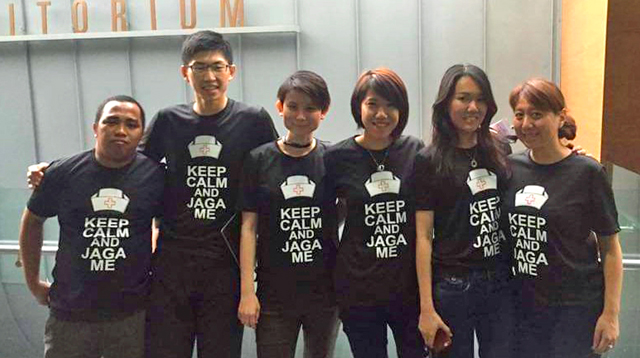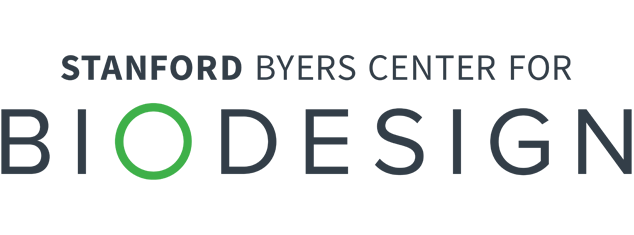Stories
On-demand home healthcare for the elderly
 Rena Dharmawan (center right) and the Jaga-Me team.
Rena Dharmawan (center right) and the Jaga-Me team.
Serial innovator Rena Dharmawan, who trained as a Singapore-Stanford Biodesign fellow in 2014, was energized when she attended HackMed, a hackathon organized by MIT to address public health problems in Singapore. She was especially intrigued by a problem pitched by Ling Ling, a former ICU and homecare nurse, focused on the limited availability of healthcare services in the home setting for elderly Singaporeans. Dharmawan, a general surgeon, joined forces with Ling and two engineers, Aaron Lee and Julian Koo, to tackle this challenge at the hackathon event.
“Home healthcare in Singapore is very fragmented,” said Dharmawan. “There’s only one community foundation that provides this service across Singapore, and the alternative - private nurses - are extremely expensive. As a result, elderly patients are often forced to seek care in the emergency department for routine problems like wound care or a dropped nasogastric tube that require medical attention but could be addressed at home.”
She continued, “Ling first observed this need as a practicing nurse in a public hospital when she saw the same elderly patients returning again and again.” Dharmawan noted that roughly 50 percent of hospital beds in Singapore are occupied by people over the age of 65, and the elderly population is projected to double in ten years. “Treating everything at the hospital is a very inefficient way to take care of an aging population,” she said.
Dharmawan and her team realized that there were significant drawbacks for patients when seeking ER care as well, including the burden of travel to the facility, exposure to the germ-filled hospital environment, long wait times, and lots of paperwork. Based on this understanding, the team set out to find a way to deliver convenient, high-quality healthcare to the elderly in the home setting.
Ling, who had left the hospital to become a homecare nurse at HNF, Singapore’s home nursing foundation, knew of a resource pool that could potentially be leveraged to help them create a solution. “Roughly 15 percent of the trained nurses in Singapore aren’t working to their maximum capacity because they can’t find a position with enough flexibility,” explained Dharmawan. “Often these are nurses who have just started their own families, or they are retired and don’t want a full time job.”
Over the course of 48 intense hours at the hackathon, Dharmawan’s team brainstormed a digital platform that would match patients and their families to these nearby nurses to provide on-demand nursing services in the comfort of the patients’ homes. They presented their pitch to the judges and won, gaining access to workspace, mentorship and other resources to help them take their idea forward.
As a first step in pursuing the project, Dharmawan and her teammates put technology development on hold and dove into a more thorough assessment of the unmet need. “We interviewed hundreds of patients and caregivers to understand their different perspectives,” said Dharmawan. “Then we story-boarded the opportunities and challenges in the space to help us define a better way to meet the needs of patients holistically, conveniently, and personally.”
The interviews helped the team realize that there was an opportunity to delve deeper into the patient journey and use their platform to provide greater continuity of care. “We built in additional functionality so that the app could be used to track the patient’s medical history, help manage nutrition and medication, and even be a portal for information about the patient’s medical condition,” explained Dharmawan. “It’s an example of how technology can amplify rather than replace medical professionals.”
The team named the company formed to commercialize the technology Jaga-Me, which in Malay translates to “Take care of me.” Koo explained how the technology works. “Before being discharged from the hospital, the patient and their families are given the Jaga-Me app and access to our online platform. They can use the app to arrange a medical escort home if needed, manage their outpatient care, order relevant supplies and equipment, and opt to share patient information with other medical providers.” He continued, “We’re even adding a home doctor component for when a higher level of care is needed.”
According to Koo, one of their biggest challenges in bringing Jaga-Me to the market was the relative nascence of the healthcare innovation ecosystem in Singapore. “When we first started, there were few precedents of clinicians and digital health innovators working together,” Koo noted. “So acquiring our early adopters was considerably more challenging that if we had been a consumer tech startup. But it got easier as we gained the trust of patients and clinicians through our quality management process,” he said.
Similar challenges also applied to the fundraising landscape for health technology. While Singapore has seen an explosion of venture capital for consumer tech, relatively few investors possess a deep understanding of the healthcare space, meaning that many innovators start off with the help of government grants instead. “It is very achievable for young start-ups to get proof of concept funding from the government,” said Koo. “But you need commercial capital to scale up, so there is a real need for greater convergence between the worlds of healthcare innovation and venture capital.”
Despite these challenges, Jaga-Me is on the market and gaining momentum. “We are currently reaching two major groups: people living with stroke and cancer,” said Dharmawan. “We work in partnership with large hospital systems in Singapore to provide post-acute care.” To date, Jaga-Me’s platform has made it possible for more than 2,000 patients to receive the personalized medical care they need at home. Koo, Lee, and Ling are actively focused on scaling the product in Singapore.
Dharmawan admits to loving the early stages of the innovation process and being happy to hand off implementation to others. Her first company, formed with her Singapore-Stanford Biodesign teammates, addressed early stage hemorrhoids. She has also spun off another company that will provide workspace for health technology start-ups. Currently she is back clinical practice, teaching innovation and the biodesign process to other physicians and actively looking for more unmet needs to address. “The Biodesign Fellowship teaches you to think differently about problems,” she said. “Now when I see a need, I have the framework to quickly determine whether it is worth spending a year – or more – to work on a solution.”
